Impact of Political Factors on FDI Ownership Structure Decision
VerifiedAdded on 2022/09/07
|11
|2823
|25
AI Summary
Contribute Materials
Your contribution can guide someone’s learning journey. Share your
documents today.
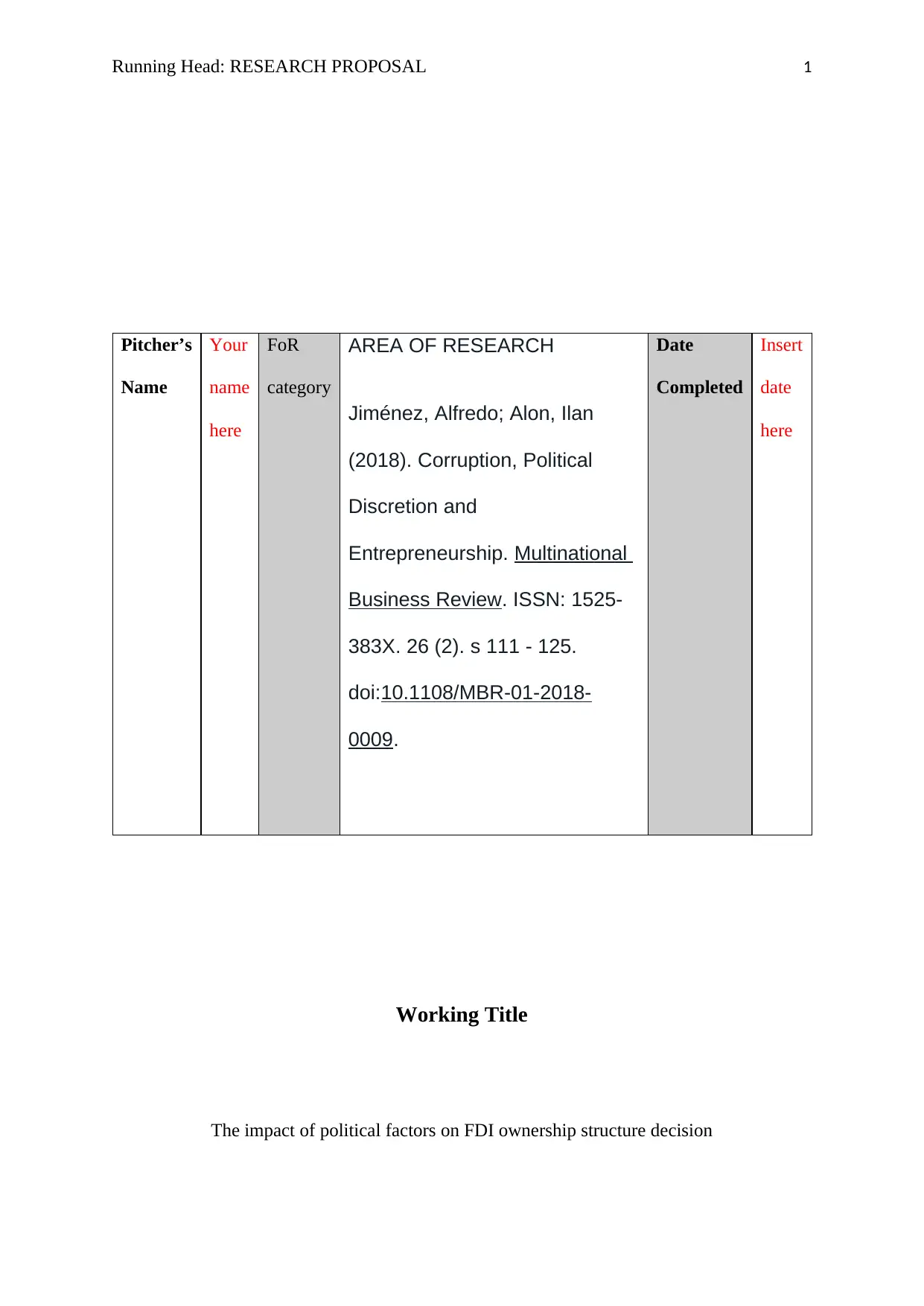
Running Head: RESEARCH PROPOSAL 1
Pitcher’s
Name
Your
name
here
FoR
category
AREA OF RESEARCH
Jiménez, Alfredo; Alon, Ilan
(2018). Corruption, Political
Discretion and
Entrepreneurship. Multinational
Business Review. ISSN: 1525-
383X. 26 (2). s 111 - 125.
doi:10.1108/MBR-01-2018-
0009.
Date
Completed
Insert
date
here
Working Title
The impact of political factors on FDI ownership structure decision
Pitcher’s
Name
Your
name
here
FoR
category
AREA OF RESEARCH
Jiménez, Alfredo; Alon, Ilan
(2018). Corruption, Political
Discretion and
Entrepreneurship. Multinational
Business Review. ISSN: 1525-
383X. 26 (2). s 111 - 125.
doi:10.1108/MBR-01-2018-
0009.
Date
Completed
Insert
date
here
Working Title
The impact of political factors on FDI ownership structure decision
Secure Best Marks with AI Grader
Need help grading? Try our AI Grader for instant feedback on your assignments.
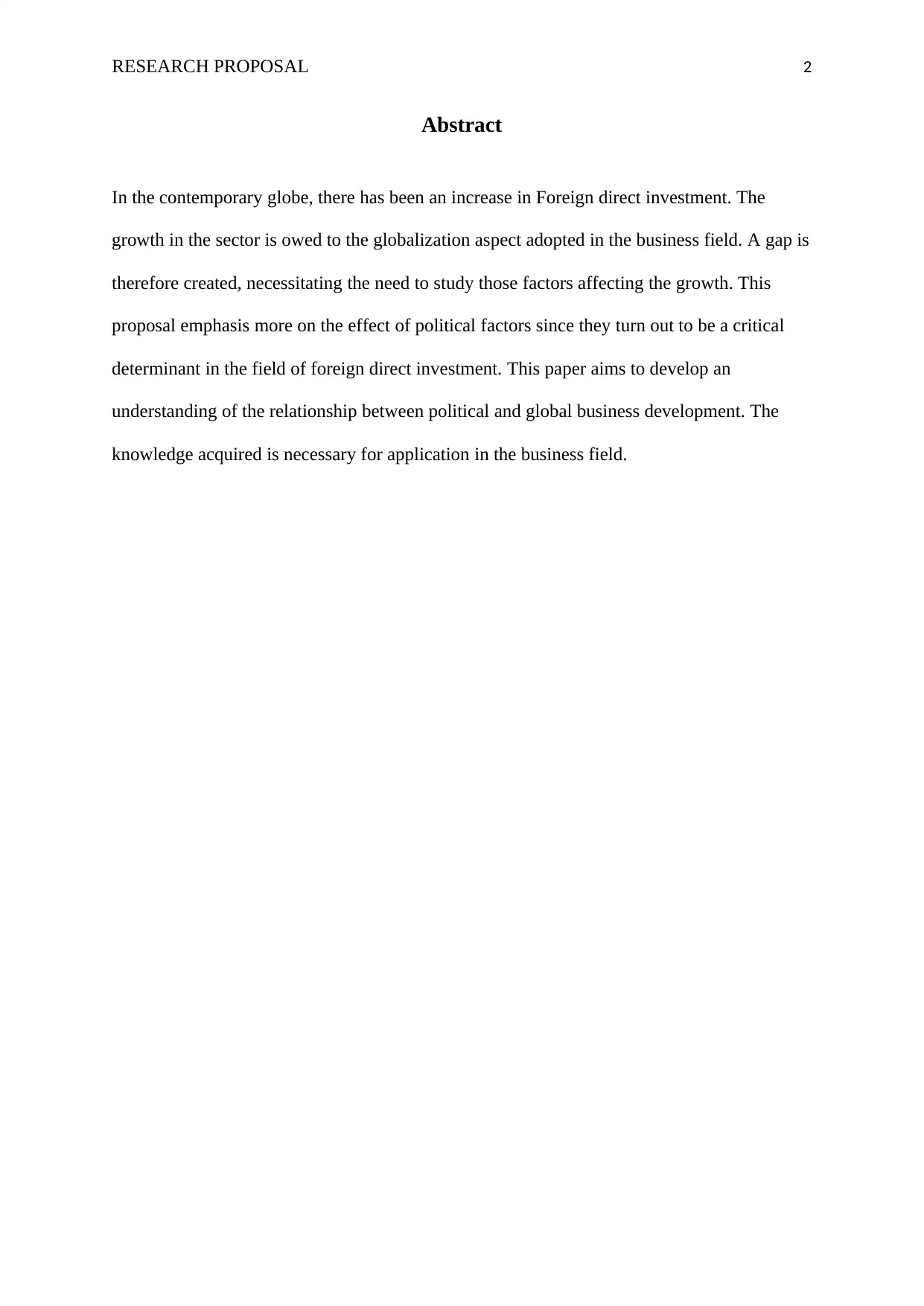
RESEARCH PROPOSAL 2
Abstract
In the contemporary globe, there has been an increase in Foreign direct investment. The
growth in the sector is owed to the globalization aspect adopted in the business field. A gap is
therefore created, necessitating the need to study those factors affecting the growth. This
proposal emphasis more on the effect of political factors since they turn out to be a critical
determinant in the field of foreign direct investment. This paper aims to develop an
understanding of the relationship between political and global business development. The
knowledge acquired is necessary for application in the business field.
Abstract
In the contemporary globe, there has been an increase in Foreign direct investment. The
growth in the sector is owed to the globalization aspect adopted in the business field. A gap is
therefore created, necessitating the need to study those factors affecting the growth. This
proposal emphasis more on the effect of political factors since they turn out to be a critical
determinant in the field of foreign direct investment. This paper aims to develop an
understanding of the relationship between political and global business development. The
knowledge acquired is necessary for application in the business field.
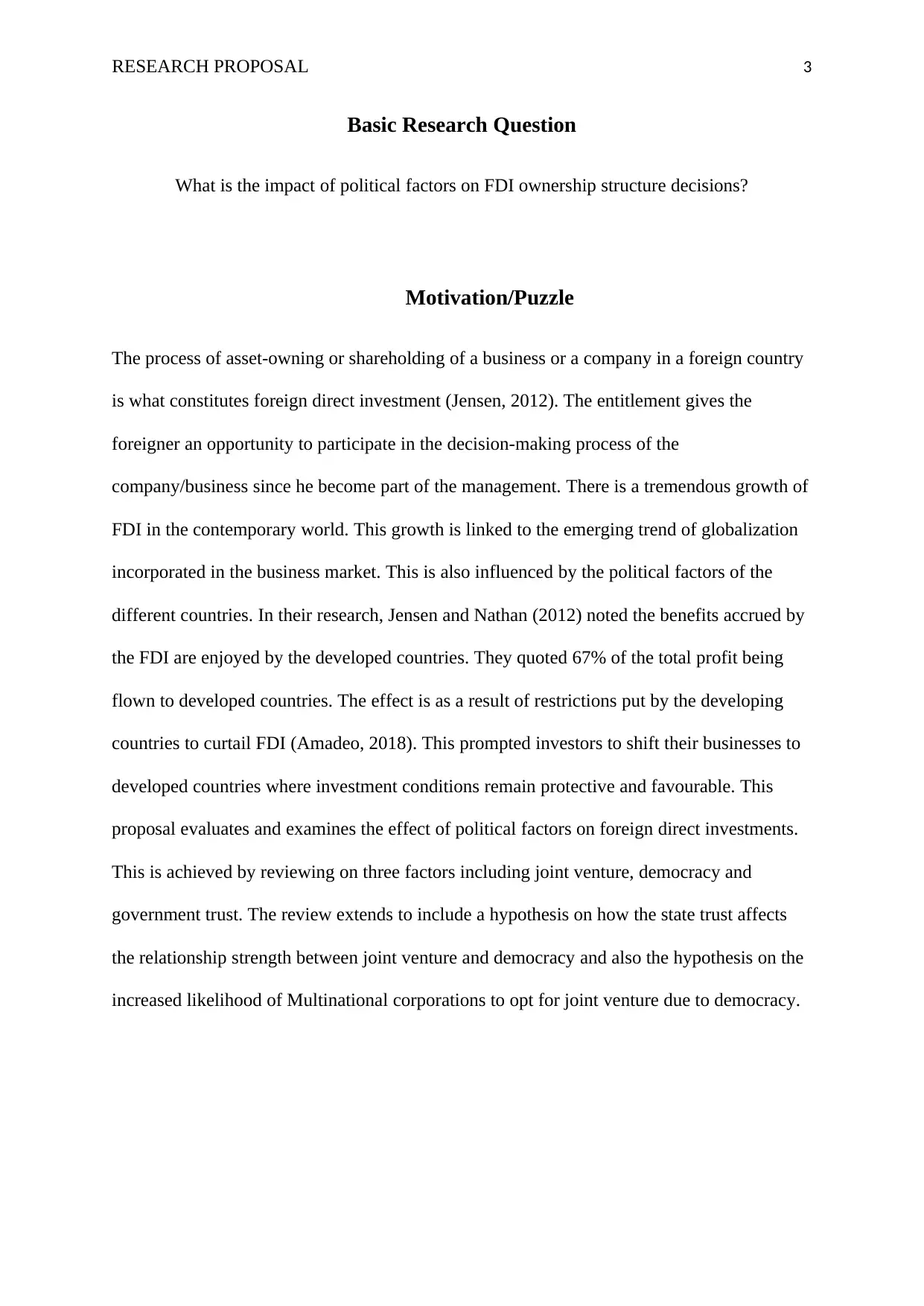
RESEARCH PROPOSAL 3
Basic Research Question
What is the impact of political factors on FDI ownership structure decisions?
Motivation/Puzzle
The process of asset-owning or shareholding of a business or a company in a foreign country
is what constitutes foreign direct investment (Jensen, 2012). The entitlement gives the
foreigner an opportunity to participate in the decision-making process of the
company/business since he become part of the management. There is a tremendous growth of
FDI in the contemporary world. This growth is linked to the emerging trend of globalization
incorporated in the business market. This is also influenced by the political factors of the
different countries. In their research, Jensen and Nathan (2012) noted the benefits accrued by
the FDI are enjoyed by the developed countries. They quoted 67% of the total profit being
flown to developed countries. The effect is as a result of restrictions put by the developing
countries to curtail FDI (Amadeo, 2018). This prompted investors to shift their businesses to
developed countries where investment conditions remain protective and favourable. This
proposal evaluates and examines the effect of political factors on foreign direct investments.
This is achieved by reviewing on three factors including joint venture, democracy and
government trust. The review extends to include a hypothesis on how the state trust affects
the relationship strength between joint venture and democracy and also the hypothesis on the
increased likelihood of Multinational corporations to opt for joint venture due to democracy.
Basic Research Question
What is the impact of political factors on FDI ownership structure decisions?
Motivation/Puzzle
The process of asset-owning or shareholding of a business or a company in a foreign country
is what constitutes foreign direct investment (Jensen, 2012). The entitlement gives the
foreigner an opportunity to participate in the decision-making process of the
company/business since he become part of the management. There is a tremendous growth of
FDI in the contemporary world. This growth is linked to the emerging trend of globalization
incorporated in the business market. This is also influenced by the political factors of the
different countries. In their research, Jensen and Nathan (2012) noted the benefits accrued by
the FDI are enjoyed by the developed countries. They quoted 67% of the total profit being
flown to developed countries. The effect is as a result of restrictions put by the developing
countries to curtail FDI (Amadeo, 2018). This prompted investors to shift their businesses to
developed countries where investment conditions remain protective and favourable. This
proposal evaluates and examines the effect of political factors on foreign direct investments.
This is achieved by reviewing on three factors including joint venture, democracy and
government trust. The review extends to include a hypothesis on how the state trust affects
the relationship strength between joint venture and democracy and also the hypothesis on the
increased likelihood of Multinational corporations to opt for joint venture due to democracy.
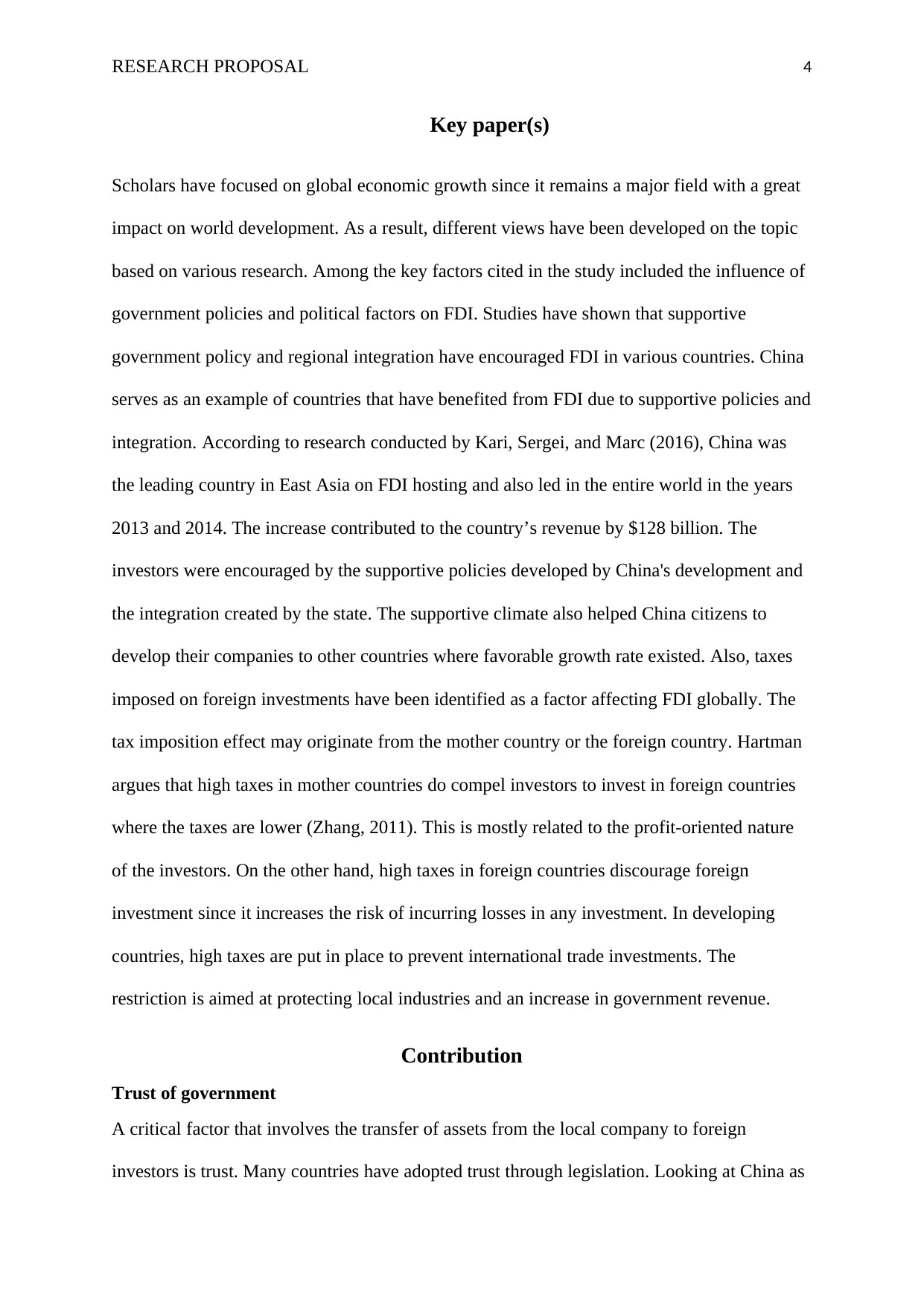
RESEARCH PROPOSAL 4
Key paper(s)
Scholars have focused on global economic growth since it remains a major field with a great
impact on world development. As a result, different views have been developed on the topic
based on various research. Among the key factors cited in the study included the influence of
government policies and political factors on FDI. Studies have shown that supportive
government policy and regional integration have encouraged FDI in various countries. China
serves as an example of countries that have benefited from FDI due to supportive policies and
integration. According to research conducted by Kari, Sergei, and Marc (2016), China was
the leading country in East Asia on FDI hosting and also led in the entire world in the years
2013 and 2014. The increase contributed to the country’s revenue by $128 billion. The
investors were encouraged by the supportive policies developed by China's development and
the integration created by the state. The supportive climate also helped China citizens to
develop their companies to other countries where favorable growth rate existed. Also, taxes
imposed on foreign investments have been identified as a factor affecting FDI globally. The
tax imposition effect may originate from the mother country or the foreign country. Hartman
argues that high taxes in mother countries do compel investors to invest in foreign countries
where the taxes are lower (Zhang, 2011). This is mostly related to the profit-oriented nature
of the investors. On the other hand, high taxes in foreign countries discourage foreign
investment since it increases the risk of incurring losses in any investment. In developing
countries, high taxes are put in place to prevent international trade investments. The
restriction is aimed at protecting local industries and an increase in government revenue.
Contribution
Trust of government
A critical factor that involves the transfer of assets from the local company to foreign
investors is trust. Many countries have adopted trust through legislation. Looking at China as
Key paper(s)
Scholars have focused on global economic growth since it remains a major field with a great
impact on world development. As a result, different views have been developed on the topic
based on various research. Among the key factors cited in the study included the influence of
government policies and political factors on FDI. Studies have shown that supportive
government policy and regional integration have encouraged FDI in various countries. China
serves as an example of countries that have benefited from FDI due to supportive policies and
integration. According to research conducted by Kari, Sergei, and Marc (2016), China was
the leading country in East Asia on FDI hosting and also led in the entire world in the years
2013 and 2014. The increase contributed to the country’s revenue by $128 billion. The
investors were encouraged by the supportive policies developed by China's development and
the integration created by the state. The supportive climate also helped China citizens to
develop their companies to other countries where favorable growth rate existed. Also, taxes
imposed on foreign investments have been identified as a factor affecting FDI globally. The
tax imposition effect may originate from the mother country or the foreign country. Hartman
argues that high taxes in mother countries do compel investors to invest in foreign countries
where the taxes are lower (Zhang, 2011). This is mostly related to the profit-oriented nature
of the investors. On the other hand, high taxes in foreign countries discourage foreign
investment since it increases the risk of incurring losses in any investment. In developing
countries, high taxes are put in place to prevent international trade investments. The
restriction is aimed at protecting local industries and an increase in government revenue.
Contribution
Trust of government
A critical factor that involves the transfer of assets from the local company to foreign
investors is trust. Many countries have adopted trust through legislation. Looking at China as
Secure Best Marks with AI Grader
Need help grading? Try our AI Grader for instant feedback on your assignments.
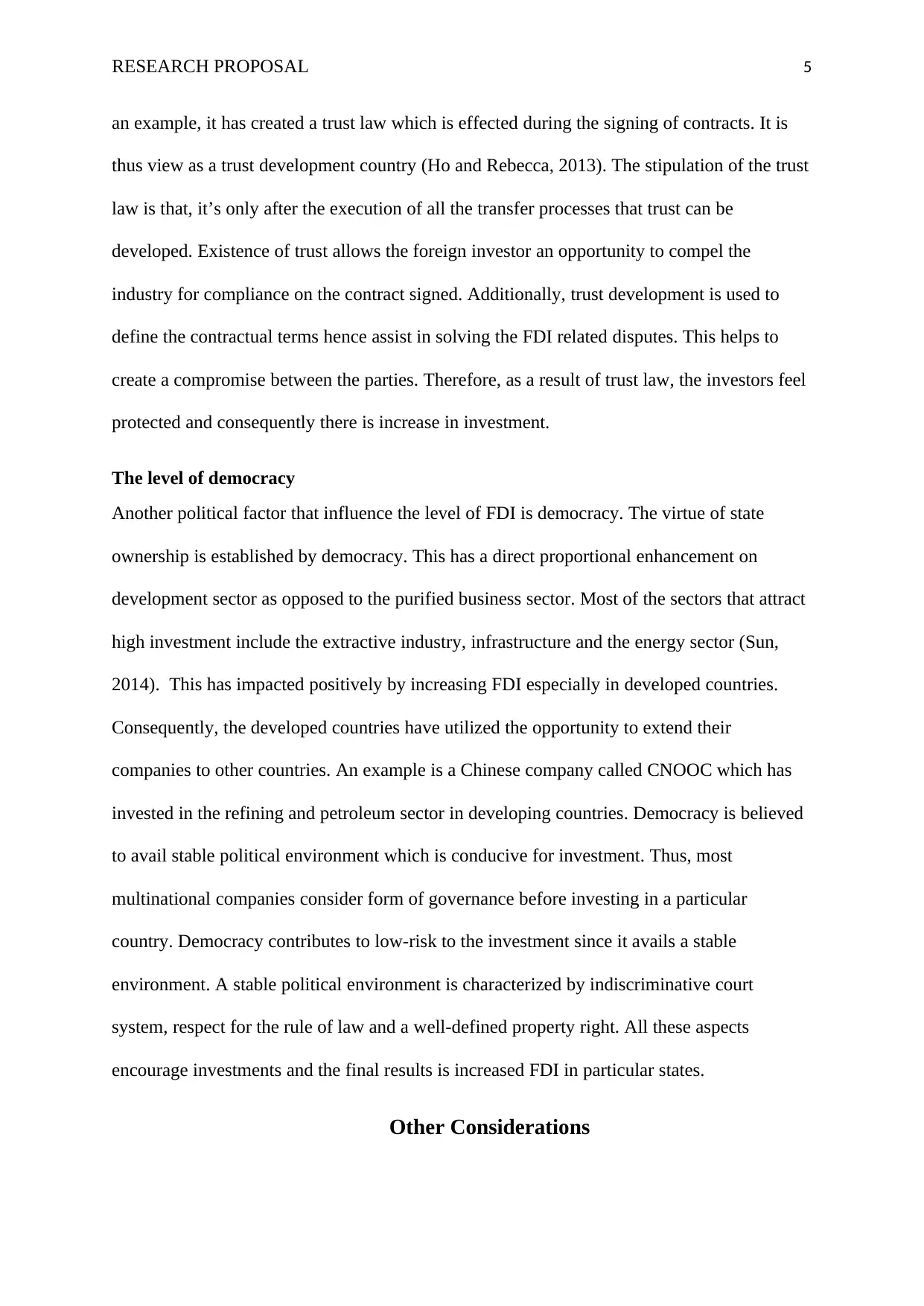
RESEARCH PROPOSAL 5
an example, it has created a trust law which is effected during the signing of contracts. It is
thus view as a trust development country (Ho and Rebecca, 2013). The stipulation of the trust
law is that, it’s only after the execution of all the transfer processes that trust can be
developed. Existence of trust allows the foreign investor an opportunity to compel the
industry for compliance on the contract signed. Additionally, trust development is used to
define the contractual terms hence assist in solving the FDI related disputes. This helps to
create a compromise between the parties. Therefore, as a result of trust law, the investors feel
protected and consequently there is increase in investment.
The level of democracy
Another political factor that influence the level of FDI is democracy. The virtue of state
ownership is established by democracy. This has a direct proportional enhancement on
development sector as opposed to the purified business sector. Most of the sectors that attract
high investment include the extractive industry, infrastructure and the energy sector (Sun,
2014). This has impacted positively by increasing FDI especially in developed countries.
Consequently, the developed countries have utilized the opportunity to extend their
companies to other countries. An example is a Chinese company called CNOOC which has
invested in the refining and petroleum sector in developing countries. Democracy is believed
to avail stable political environment which is conducive for investment. Thus, most
multinational companies consider form of governance before investing in a particular
country. Democracy contributes to low-risk to the investment since it avails a stable
environment. A stable political environment is characterized by indiscriminative court
system, respect for the rule of law and a well-defined property right. All these aspects
encourage investments and the final results is increased FDI in particular states.
Other Considerations
an example, it has created a trust law which is effected during the signing of contracts. It is
thus view as a trust development country (Ho and Rebecca, 2013). The stipulation of the trust
law is that, it’s only after the execution of all the transfer processes that trust can be
developed. Existence of trust allows the foreign investor an opportunity to compel the
industry for compliance on the contract signed. Additionally, trust development is used to
define the contractual terms hence assist in solving the FDI related disputes. This helps to
create a compromise between the parties. Therefore, as a result of trust law, the investors feel
protected and consequently there is increase in investment.
The level of democracy
Another political factor that influence the level of FDI is democracy. The virtue of state
ownership is established by democracy. This has a direct proportional enhancement on
development sector as opposed to the purified business sector. Most of the sectors that attract
high investment include the extractive industry, infrastructure and the energy sector (Sun,
2014). This has impacted positively by increasing FDI especially in developed countries.
Consequently, the developed countries have utilized the opportunity to extend their
companies to other countries. An example is a Chinese company called CNOOC which has
invested in the refining and petroleum sector in developing countries. Democracy is believed
to avail stable political environment which is conducive for investment. Thus, most
multinational companies consider form of governance before investing in a particular
country. Democracy contributes to low-risk to the investment since it avails a stable
environment. A stable political environment is characterized by indiscriminative court
system, respect for the rule of law and a well-defined property right. All these aspects
encourage investments and the final results is increased FDI in particular states.
Other Considerations
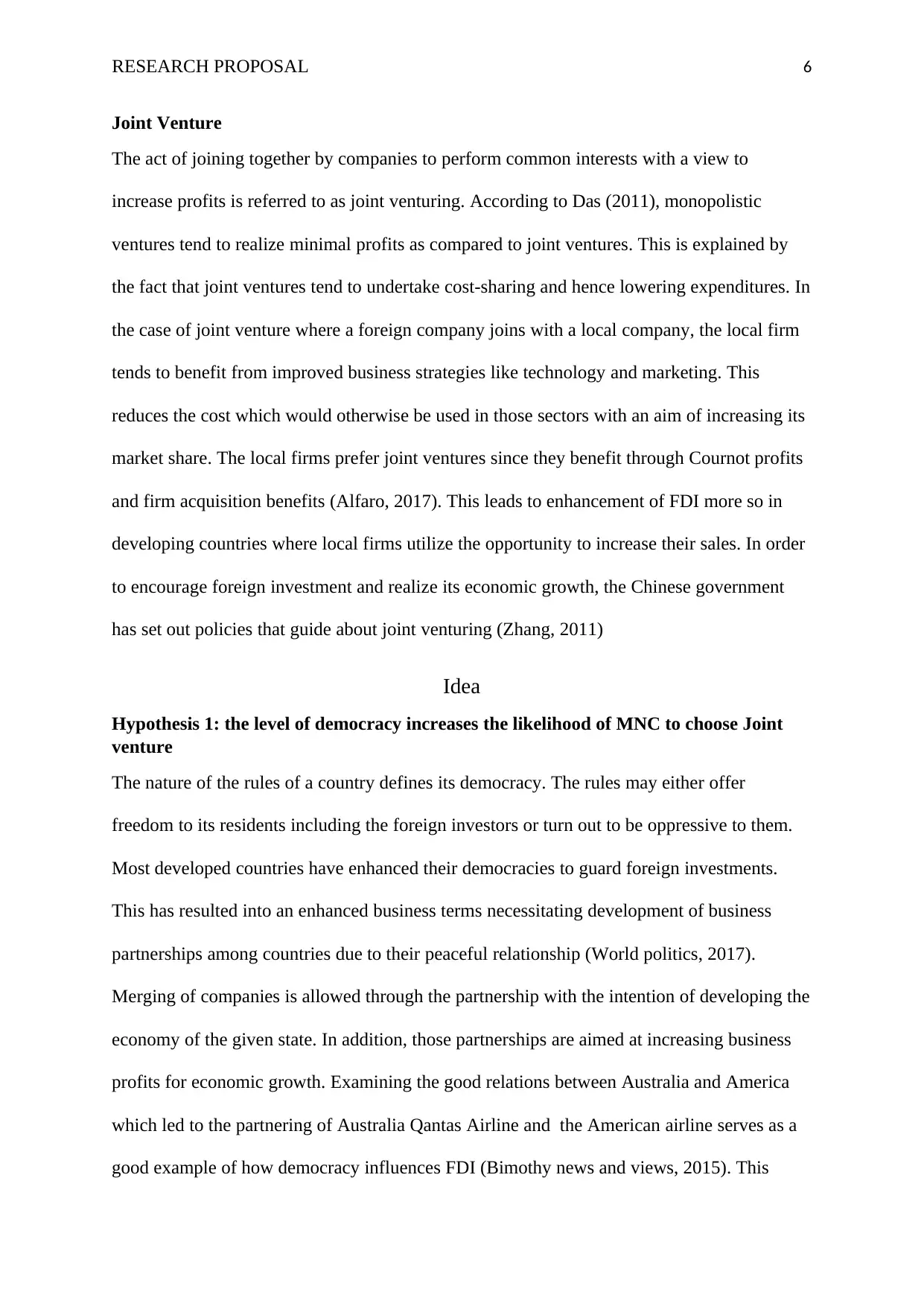
RESEARCH PROPOSAL 6
Joint Venture
The act of joining together by companies to perform common interests with a view to
increase profits is referred to as joint venturing. According to Das (2011), monopolistic
ventures tend to realize minimal profits as compared to joint ventures. This is explained by
the fact that joint ventures tend to undertake cost-sharing and hence lowering expenditures. In
the case of joint venture where a foreign company joins with a local company, the local firm
tends to benefit from improved business strategies like technology and marketing. This
reduces the cost which would otherwise be used in those sectors with an aim of increasing its
market share. The local firms prefer joint ventures since they benefit through Cournot profits
and firm acquisition benefits (Alfaro, 2017). This leads to enhancement of FDI more so in
developing countries where local firms utilize the opportunity to increase their sales. In order
to encourage foreign investment and realize its economic growth, the Chinese government
has set out policies that guide about joint venturing (Zhang, 2011)
Idea
Hypothesis 1: the level of democracy increases the likelihood of MNC to choose Joint
venture
The nature of the rules of a country defines its democracy. The rules may either offer
freedom to its residents including the foreign investors or turn out to be oppressive to them.
Most developed countries have enhanced their democracies to guard foreign investments.
This has resulted into an enhanced business terms necessitating development of business
partnerships among countries due to their peaceful relationship (World politics, 2017).
Merging of companies is allowed through the partnership with the intention of developing the
economy of the given state. In addition, those partnerships are aimed at increasing business
profits for economic growth. Examining the good relations between Australia and America
which led to the partnering of Australia Qantas Airline and the American airline serves as a
good example of how democracy influences FDI (Bimothy news and views, 2015). This
Joint Venture
The act of joining together by companies to perform common interests with a view to
increase profits is referred to as joint venturing. According to Das (2011), monopolistic
ventures tend to realize minimal profits as compared to joint ventures. This is explained by
the fact that joint ventures tend to undertake cost-sharing and hence lowering expenditures. In
the case of joint venture where a foreign company joins with a local company, the local firm
tends to benefit from improved business strategies like technology and marketing. This
reduces the cost which would otherwise be used in those sectors with an aim of increasing its
market share. The local firms prefer joint ventures since they benefit through Cournot profits
and firm acquisition benefits (Alfaro, 2017). This leads to enhancement of FDI more so in
developing countries where local firms utilize the opportunity to increase their sales. In order
to encourage foreign investment and realize its economic growth, the Chinese government
has set out policies that guide about joint venturing (Zhang, 2011)
Idea
Hypothesis 1: the level of democracy increases the likelihood of MNC to choose Joint
venture
The nature of the rules of a country defines its democracy. The rules may either offer
freedom to its residents including the foreign investors or turn out to be oppressive to them.
Most developed countries have enhanced their democracies to guard foreign investments.
This has resulted into an enhanced business terms necessitating development of business
partnerships among countries due to their peaceful relationship (World politics, 2017).
Merging of companies is allowed through the partnership with the intention of developing the
economy of the given state. In addition, those partnerships are aimed at increasing business
profits for economic growth. Examining the good relations between Australia and America
which led to the partnering of Australia Qantas Airline and the American airline serves as a
good example of how democracy influences FDI (Bimothy news and views, 2015). This
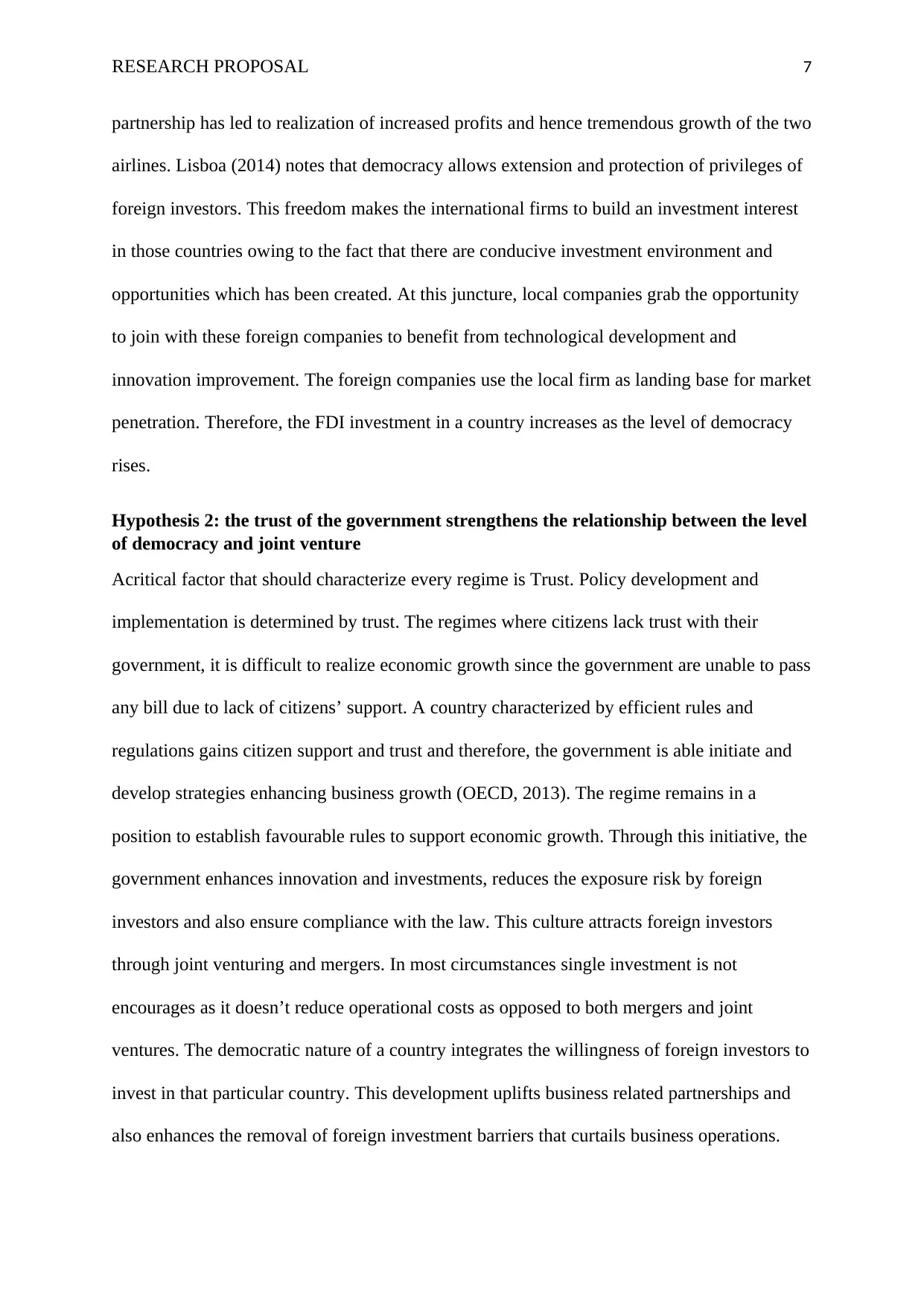
RESEARCH PROPOSAL 7
partnership has led to realization of increased profits and hence tremendous growth of the two
airlines. Lisboa (2014) notes that democracy allows extension and protection of privileges of
foreign investors. This freedom makes the international firms to build an investment interest
in those countries owing to the fact that there are conducive investment environment and
opportunities which has been created. At this juncture, local companies grab the opportunity
to join with these foreign companies to benefit from technological development and
innovation improvement. The foreign companies use the local firm as landing base for market
penetration. Therefore, the FDI investment in a country increases as the level of democracy
rises.
Hypothesis 2: the trust of the government strengthens the relationship between the level
of democracy and joint venture
Acritical factor that should characterize every regime is Trust. Policy development and
implementation is determined by trust. The regimes where citizens lack trust with their
government, it is difficult to realize economic growth since the government are unable to pass
any bill due to lack of citizens’ support. A country characterized by efficient rules and
regulations gains citizen support and trust and therefore, the government is able initiate and
develop strategies enhancing business growth (OECD, 2013). The regime remains in a
position to establish favourable rules to support economic growth. Through this initiative, the
government enhances innovation and investments, reduces the exposure risk by foreign
investors and also ensure compliance with the law. This culture attracts foreign investors
through joint venturing and mergers. In most circumstances single investment is not
encourages as it doesn’t reduce operational costs as opposed to both mergers and joint
ventures. The democratic nature of a country integrates the willingness of foreign investors to
invest in that particular country. This development uplifts business related partnerships and
also enhances the removal of foreign investment barriers that curtails business operations.
partnership has led to realization of increased profits and hence tremendous growth of the two
airlines. Lisboa (2014) notes that democracy allows extension and protection of privileges of
foreign investors. This freedom makes the international firms to build an investment interest
in those countries owing to the fact that there are conducive investment environment and
opportunities which has been created. At this juncture, local companies grab the opportunity
to join with these foreign companies to benefit from technological development and
innovation improvement. The foreign companies use the local firm as landing base for market
penetration. Therefore, the FDI investment in a country increases as the level of democracy
rises.
Hypothesis 2: the trust of the government strengthens the relationship between the level
of democracy and joint venture
Acritical factor that should characterize every regime is Trust. Policy development and
implementation is determined by trust. The regimes where citizens lack trust with their
government, it is difficult to realize economic growth since the government are unable to pass
any bill due to lack of citizens’ support. A country characterized by efficient rules and
regulations gains citizen support and trust and therefore, the government is able initiate and
develop strategies enhancing business growth (OECD, 2013). The regime remains in a
position to establish favourable rules to support economic growth. Through this initiative, the
government enhances innovation and investments, reduces the exposure risk by foreign
investors and also ensure compliance with the law. This culture attracts foreign investors
through joint venturing and mergers. In most circumstances single investment is not
encourages as it doesn’t reduce operational costs as opposed to both mergers and joint
ventures. The democratic nature of a country integrates the willingness of foreign investors to
invest in that particular country. This development uplifts business related partnerships and
also enhances the removal of foreign investment barriers that curtails business operations.
Paraphrase This Document
Need a fresh take? Get an instant paraphrase of this document with our AI Paraphraser
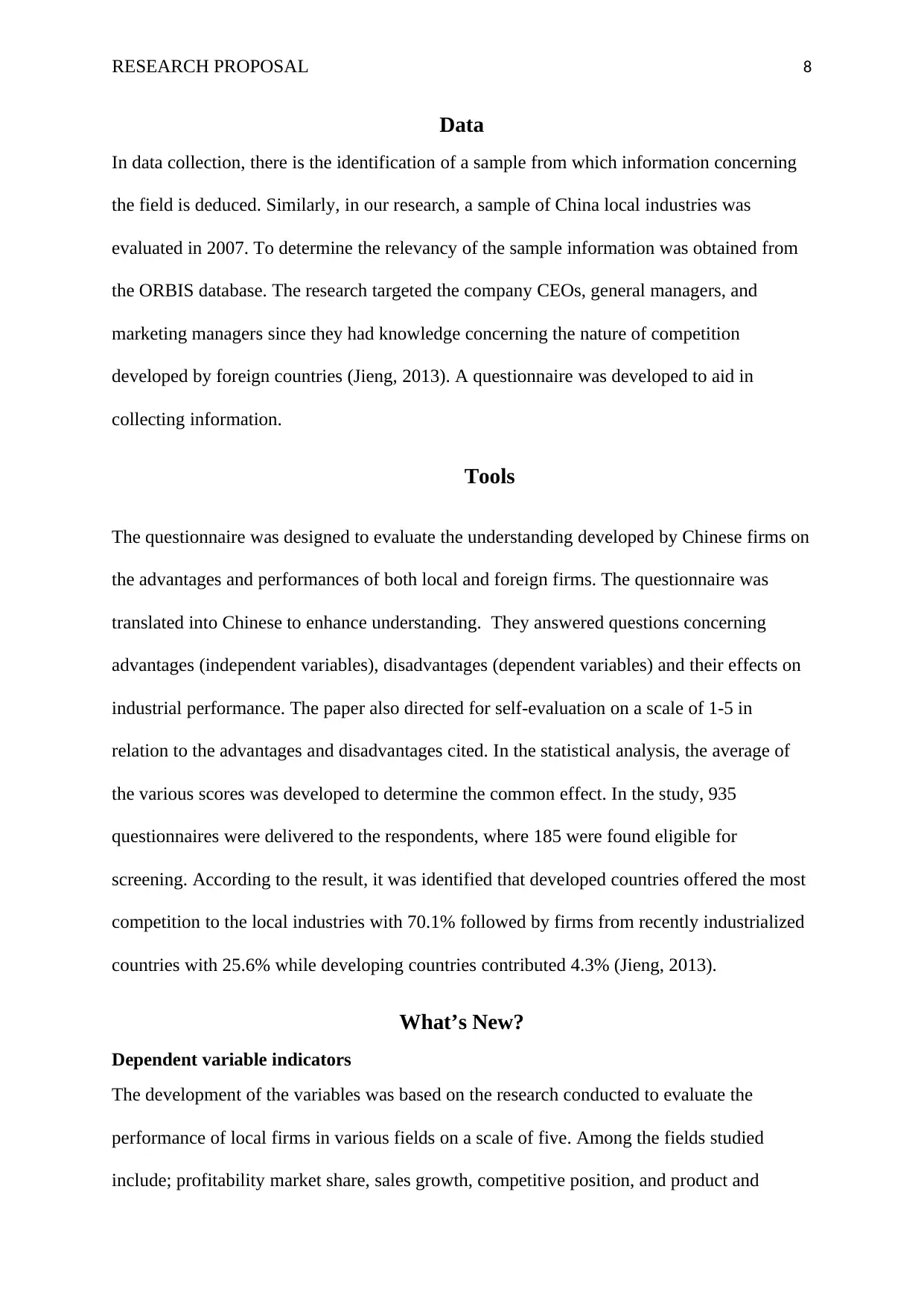
RESEARCH PROPOSAL 8
Data
In data collection, there is the identification of a sample from which information concerning
the field is deduced. Similarly, in our research, a sample of China local industries was
evaluated in 2007. To determine the relevancy of the sample information was obtained from
the ORBIS database. The research targeted the company CEOs, general managers, and
marketing managers since they had knowledge concerning the nature of competition
developed by foreign countries (Jieng, 2013). A questionnaire was developed to aid in
collecting information.
Tools
The questionnaire was designed to evaluate the understanding developed by Chinese firms on
the advantages and performances of both local and foreign firms. The questionnaire was
translated into Chinese to enhance understanding. They answered questions concerning
advantages (independent variables), disadvantages (dependent variables) and their effects on
industrial performance. The paper also directed for self-evaluation on a scale of 1-5 in
relation to the advantages and disadvantages cited. In the statistical analysis, the average of
the various scores was developed to determine the common effect. In the study, 935
questionnaires were delivered to the respondents, where 185 were found eligible for
screening. According to the result, it was identified that developed countries offered the most
competition to the local industries with 70.1% followed by firms from recently industrialized
countries with 25.6% while developing countries contributed 4.3% (Jieng, 2013).
What’s New?
Dependent variable indicators
The development of the variables was based on the research conducted to evaluate the
performance of local firms in various fields on a scale of five. Among the fields studied
include; profitability market share, sales growth, competitive position, and product and
Data
In data collection, there is the identification of a sample from which information concerning
the field is deduced. Similarly, in our research, a sample of China local industries was
evaluated in 2007. To determine the relevancy of the sample information was obtained from
the ORBIS database. The research targeted the company CEOs, general managers, and
marketing managers since they had knowledge concerning the nature of competition
developed by foreign countries (Jieng, 2013). A questionnaire was developed to aid in
collecting information.
Tools
The questionnaire was designed to evaluate the understanding developed by Chinese firms on
the advantages and performances of both local and foreign firms. The questionnaire was
translated into Chinese to enhance understanding. They answered questions concerning
advantages (independent variables), disadvantages (dependent variables) and their effects on
industrial performance. The paper also directed for self-evaluation on a scale of 1-5 in
relation to the advantages and disadvantages cited. In the statistical analysis, the average of
the various scores was developed to determine the common effect. In the study, 935
questionnaires were delivered to the respondents, where 185 were found eligible for
screening. According to the result, it was identified that developed countries offered the most
competition to the local industries with 70.1% followed by firms from recently industrialized
countries with 25.6% while developing countries contributed 4.3% (Jieng, 2013).
What’s New?
Dependent variable indicators
The development of the variables was based on the research conducted to evaluate the
performance of local firms in various fields on a scale of five. Among the fields studied
include; profitability market share, sales growth, competitive position, and product and
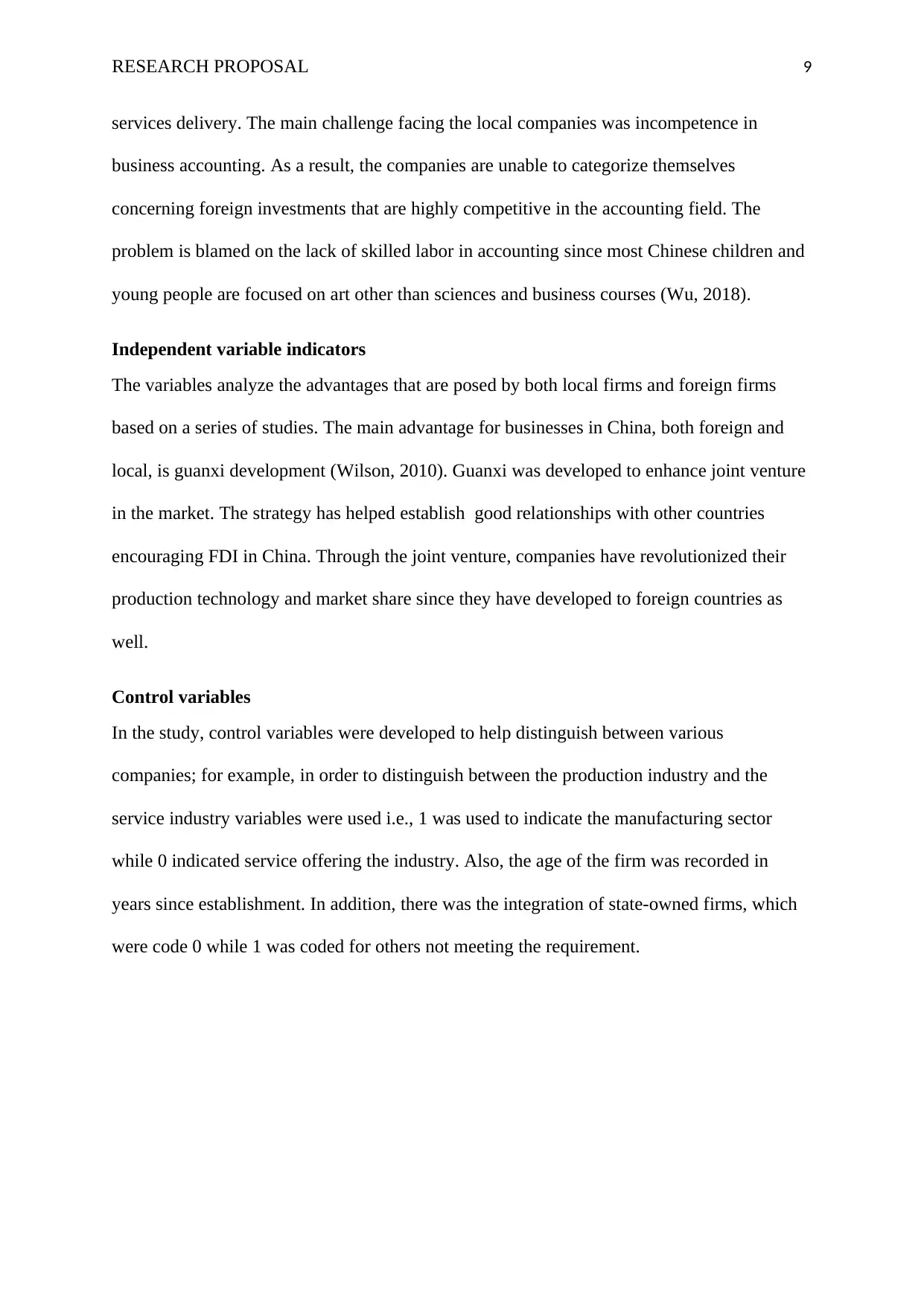
RESEARCH PROPOSAL 9
services delivery. The main challenge facing the local companies was incompetence in
business accounting. As a result, the companies are unable to categorize themselves
concerning foreign investments that are highly competitive in the accounting field. The
problem is blamed on the lack of skilled labor in accounting since most Chinese children and
young people are focused on art other than sciences and business courses (Wu, 2018).
Independent variable indicators
The variables analyze the advantages that are posed by both local firms and foreign firms
based on a series of studies. The main advantage for businesses in China, both foreign and
local, is guanxi development (Wilson, 2010). Guanxi was developed to enhance joint venture
in the market. The strategy has helped establish good relationships with other countries
encouraging FDI in China. Through the joint venture, companies have revolutionized their
production technology and market share since they have developed to foreign countries as
well.
Control variables
In the study, control variables were developed to help distinguish between various
companies; for example, in order to distinguish between the production industry and the
service industry variables were used i.e., 1 was used to indicate the manufacturing sector
while 0 indicated service offering the industry. Also, the age of the firm was recorded in
years since establishment. In addition, there was the integration of state-owned firms, which
were code 0 while 1 was coded for others not meeting the requirement.
services delivery. The main challenge facing the local companies was incompetence in
business accounting. As a result, the companies are unable to categorize themselves
concerning foreign investments that are highly competitive in the accounting field. The
problem is blamed on the lack of skilled labor in accounting since most Chinese children and
young people are focused on art other than sciences and business courses (Wu, 2018).
Independent variable indicators
The variables analyze the advantages that are posed by both local firms and foreign firms
based on a series of studies. The main advantage for businesses in China, both foreign and
local, is guanxi development (Wilson, 2010). Guanxi was developed to enhance joint venture
in the market. The strategy has helped establish good relationships with other countries
encouraging FDI in China. Through the joint venture, companies have revolutionized their
production technology and market share since they have developed to foreign countries as
well.
Control variables
In the study, control variables were developed to help distinguish between various
companies; for example, in order to distinguish between the production industry and the
service industry variables were used i.e., 1 was used to indicate the manufacturing sector
while 0 indicated service offering the industry. Also, the age of the firm was recorded in
years since establishment. In addition, there was the integration of state-owned firms, which
were code 0 while 1 was coded for others not meeting the requirement.
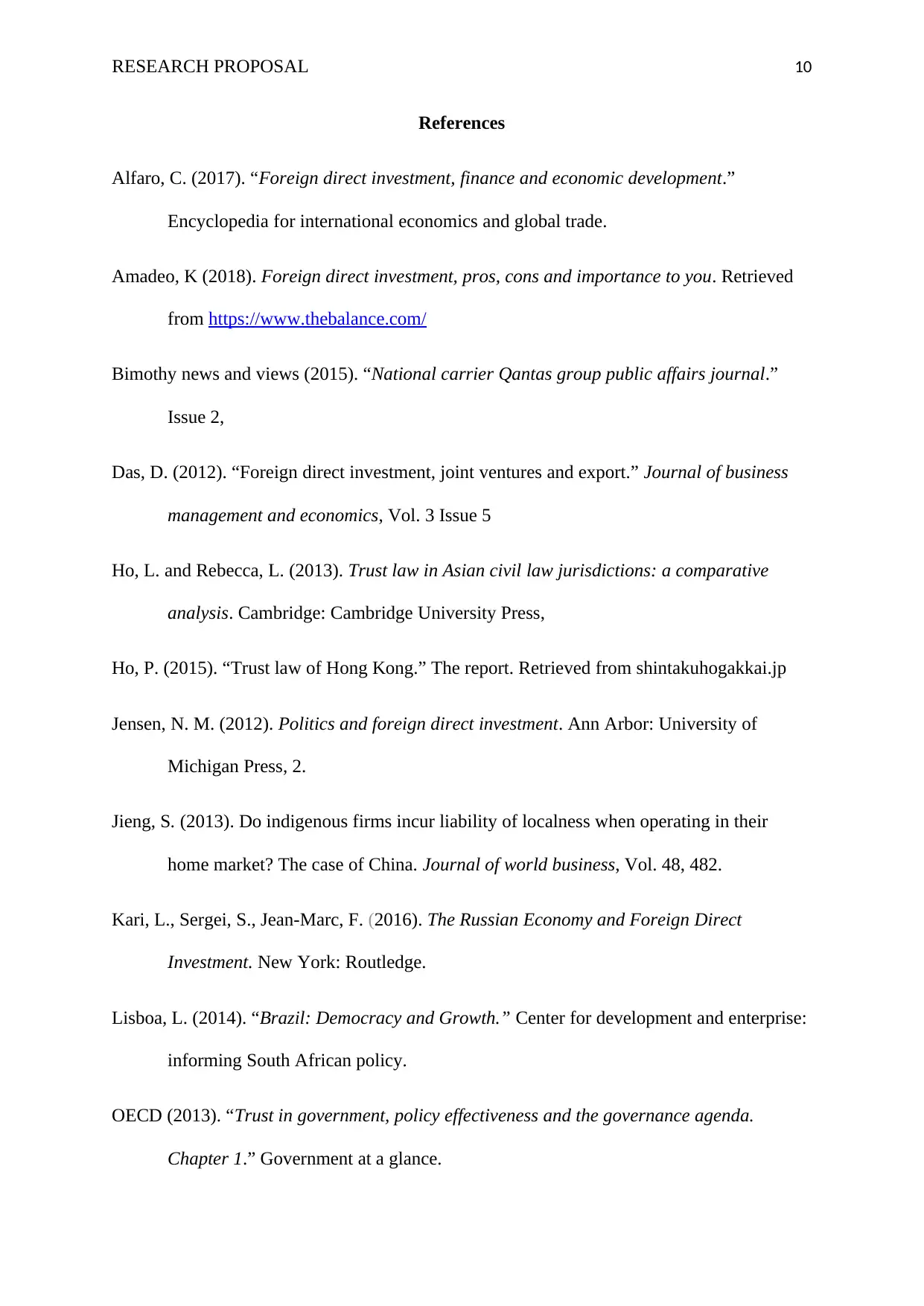
RESEARCH PROPOSAL 10
References
Alfaro, C. (2017). “Foreign direct investment, finance and economic development.”
Encyclopedia for international economics and global trade.
Amadeo, K (2018). Foreign direct investment, pros, cons and importance to you. Retrieved
from https://www.thebalance.com/
Bimothy news and views (2015). “National carrier Qantas group public affairs journal.”
Issue 2,
Das, D. (2012). “Foreign direct investment, joint ventures and export.” Journal of business
management and economics, Vol. 3 Issue 5
Ho, L. and Rebecca, L. (2013). Trust law in Asian civil law jurisdictions: a comparative
analysis. Cambridge: Cambridge University Press,
Ho, P. (2015). “Trust law of Hong Kong.” The report. Retrieved from shintakuhogakkai.jp
Jensen, N. M. (2012). Politics and foreign direct investment. Ann Arbor: University of
Michigan Press, 2.
Jieng, S. (2013). Do indigenous firms incur liability of localness when operating in their
home market? The case of China. Journal of world business, Vol. 48, 482.
Kari, L., Sergei, S., Jean-Marc, F. (2016). The Russian Economy and Foreign Direct
Investment. New York: Routledge.
Lisboa, L. (2014). “Brazil: Democracy and Growth.” Center for development and enterprise:
informing South African policy.
OECD (2013). “Trust in government, policy effectiveness and the governance agenda.
Chapter 1.” Government at a glance.
References
Alfaro, C. (2017). “Foreign direct investment, finance and economic development.”
Encyclopedia for international economics and global trade.
Amadeo, K (2018). Foreign direct investment, pros, cons and importance to you. Retrieved
from https://www.thebalance.com/
Bimothy news and views (2015). “National carrier Qantas group public affairs journal.”
Issue 2,
Das, D. (2012). “Foreign direct investment, joint ventures and export.” Journal of business
management and economics, Vol. 3 Issue 5
Ho, L. and Rebecca, L. (2013). Trust law in Asian civil law jurisdictions: a comparative
analysis. Cambridge: Cambridge University Press,
Ho, P. (2015). “Trust law of Hong Kong.” The report. Retrieved from shintakuhogakkai.jp
Jensen, N. M. (2012). Politics and foreign direct investment. Ann Arbor: University of
Michigan Press, 2.
Jieng, S. (2013). Do indigenous firms incur liability of localness when operating in their
home market? The case of China. Journal of world business, Vol. 48, 482.
Kari, L., Sergei, S., Jean-Marc, F. (2016). The Russian Economy and Foreign Direct
Investment. New York: Routledge.
Lisboa, L. (2014). “Brazil: Democracy and Growth.” Center for development and enterprise:
informing South African policy.
OECD (2013). “Trust in government, policy effectiveness and the governance agenda.
Chapter 1.” Government at a glance.
Secure Best Marks with AI Grader
Need help grading? Try our AI Grader for instant feedback on your assignments.
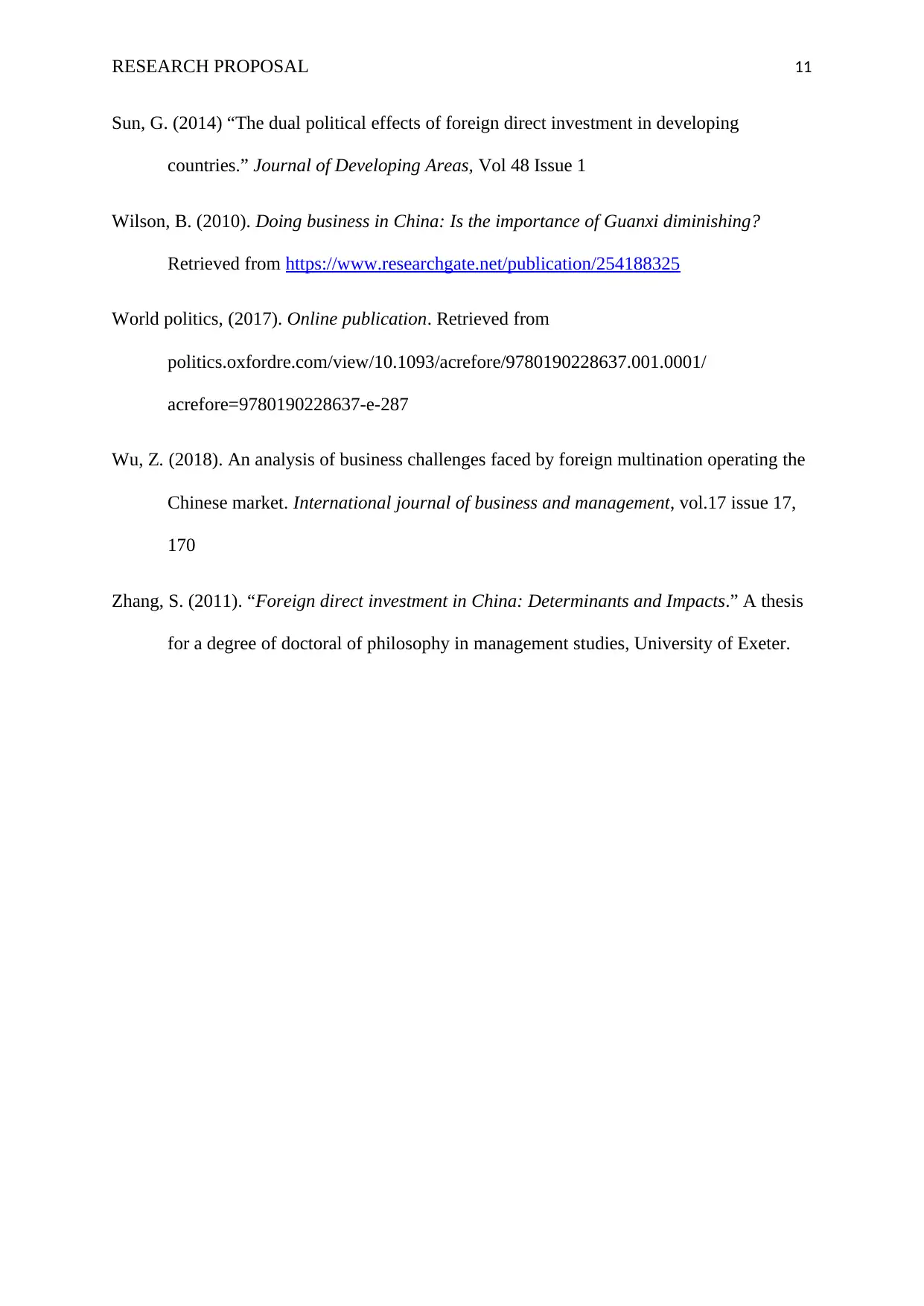
RESEARCH PROPOSAL 11
Sun, G. (2014) “The dual political effects of foreign direct investment in developing
countries.” Journal of Developing Areas, Vol 48 Issue 1
Wilson, B. (2010). Doing business in China: Is the importance of Guanxi diminishing?
Retrieved from https://www.researchgate.net/publication/254188325
World politics, (2017). Online publication. Retrieved from
politics.oxfordre.com/view/10.1093/acrefore/9780190228637.001.0001/
acrefore=9780190228637-e-287
Wu, Z. (2018). An analysis of business challenges faced by foreign multination operating the
Chinese market. International journal of business and management, vol.17 issue 17,
170
Zhang, S. (2011). “Foreign direct investment in China: Determinants and Impacts.” A thesis
for a degree of doctoral of philosophy in management studies, University of Exeter.
Sun, G. (2014) “The dual political effects of foreign direct investment in developing
countries.” Journal of Developing Areas, Vol 48 Issue 1
Wilson, B. (2010). Doing business in China: Is the importance of Guanxi diminishing?
Retrieved from https://www.researchgate.net/publication/254188325
World politics, (2017). Online publication. Retrieved from
politics.oxfordre.com/view/10.1093/acrefore/9780190228637.001.0001/
acrefore=9780190228637-e-287
Wu, Z. (2018). An analysis of business challenges faced by foreign multination operating the
Chinese market. International journal of business and management, vol.17 issue 17,
170
Zhang, S. (2011). “Foreign direct investment in China: Determinants and Impacts.” A thesis
for a degree of doctoral of philosophy in management studies, University of Exeter.
1 out of 11
Related Documents
Your All-in-One AI-Powered Toolkit for Academic Success.
+13062052269
info@desklib.com
Available 24*7 on WhatsApp / Email
![[object Object]](/_next/static/media/star-bottom.7253800d.svg)
Unlock your academic potential
© 2024 | Zucol Services PVT LTD | All rights reserved.





